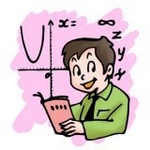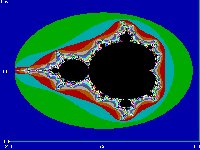
Worksheets and No Prep Teaching Resources
Reading Comprehension Worksheets
History of Mathematics

History of Mathematics
 Worksheets and No Prep Teaching Resources Reading Comprehension Worksheets History of Mathematics |
 History of Mathematics |
| edHelper's suggested reading level: | grades 9 to 12 | |
| Flesch-Kincaid grade level: | 8.94 |
|
Just When Math Got Organized, Chaos Popped Up!
By Colleen Messina |

|
 1 What do you think of when you hear the word chaos? Your bedroom, perhaps? Mathematicians use the word in a different way. Chaos theory describes many normal things that seem unorganized, but that have a pattern after all. If this doesn't make sense to you, don't worry; it took a long time for mathematicians to understand chaos. Methodical mathematicians spent hundreds of years creating numbers and inventing calculus. Just when everything seemed perfectly organized, chaos popped up.
1 What do you think of when you hear the word chaos? Your bedroom, perhaps? Mathematicians use the word in a different way. Chaos theory describes many normal things that seem unorganized, but that have a pattern after all. If this doesn't make sense to you, don't worry; it took a long time for mathematicians to understand chaos. Methodical mathematicians spent hundreds of years creating numbers and inventing calculus. Just when everything seemed perfectly organized, chaos popped up. |
Create Weekly Reading Books
Prepare for an entire week at once! |
| Leave your feedback on Just When Math Got Organized, Chaos Popped Up! (use this link if you found an error in the story) |
 |
History of Mathematics
|
 |
High School Reading Comprehensions and High School Reading Lessons
|
 |
Social Studies
|